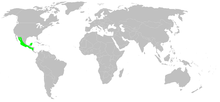Balmea
| Balmea stormae | |
|---|---|
| Scientific classification | |
| Kingdom: | Plantae |
| Clade: | Angiosperms |
| Clade: | Eudicots |
| Clade: | Asterids |
| Order: | Gentianales |
| Family: | Rubiaceae |
| Subfamily: | Cinchonoideae |
| Tribe: | Hillieae |
| Genus: | Balmea Martinez |
| Species: | B. stormae |
| Binomial name | |
| Balmea stormae Martinez | |
 | |
Balmea is a monospecific genus of flowering plants in the family Rubiaceae containing the single species Balmea stormae. It is native to El Salvador, Guatemala and Mexico (Nayarit, Jalisco, Colima, Guerrero, Michoacán, Chiapas).[1] It is locally known as ayuque.[2] It is conical in shape and used as a Christmas tree in parts of Mexico.[2] Because populations are depleted by this overharvest, this species is threatened with extinction.[2]
Description
The plant is a shrub of four to seven meters. The smooth, greenish purple bark peels off in irregular thin shreds. The hard wood is whitish. The broadly ovate and shortly acuminate leaves are clustered at the end of the branches. The shrub flowers from August to October and the hermaphroditic flowers are scarlet-red, tinged with purple. When fully open they turn dark purple and at night a sweet scent emanates from them. The fruits ripen from December to January and are erect capsules, about 25 mm long that open at the tip in two follicle-like portions. The numerous seed show reticulate wings of about 4 mm.[3]
Taxonomy
The genus is named in honor of botanist Juan Balme and the species name honors Marian Storm, a collaborator of the describer.[3] The genus is closely related to Cosmibuena and Blepharidium.[3]
References
- ↑ Davidse, G., M. Sousa Sánchez, S. Knapp & F. Chiang Cabrera. 2012. Rubiaceae a Verbenaceae. 4(2): i–xvi, 1–533. In G. Davidse, M. Sousa Sánchez, S. Knapp & F. Chiang Cabrera (eds.) Flora Mesoamericana Missouri Botanical Garden Press, St. Louis.
- 1 2 3 Fosberg, F. R. (1974). Studies in American Rubiaceae 2. Ayuque, Balmea stormae, an endangered Mexican species. Sida: Contributions to Botany, 268-270.
- 1 2 3 Martinez M (1942). "A new genus of Rubiaceae from Mexico". Bulletin of the Torrey Botanical Club. 69 (6): 438–441. doi:10.2307/2481425.